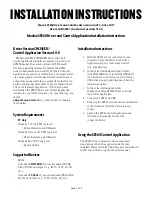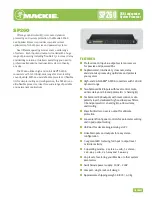
SOLIDYNE
AUDIMAX 362
Pág.
7
Chapter 2 – Theory of audio processors
NOTE:
in order to complement the study of this subject is recommended to visit our WEB
(www.solidynepro.com). In the DEMO section there are a Power Point presentation called Audio Processors. It
has a complete Technical Appendix that it analyzes how the audio processing increases the coverage area of the
FM
stereo
transmission.
.
2.1 A brief story...
From mid of the 1930 decade, when appears the
first compressors and expanders units, to the
present time, all chains of audio for broadcasting
incorporate devices whose function is to alter the
dynamic range of the sound. The advance of the
technology improves these devices during the
‘70s.
The compressors, expanders and audio limiters
were gaining in efficiency and complexity. In the
beginning, its main parameters (attack and
recovery times, thresholds, etc.) were fixed by
design or by the operator, through the device’s
controls. In the '70s, these functions begin to be
automatic, based on the characteristics of the
audio signal, but having at the same time a
control on their action to be able to customize the
sound.
When five or more devices are grouped in a same
equipment, they begin to be denominated:
AUDIO PROCESSORS.
Since 1970,
Solidyne
introduces important
advances in this field, like the invention of a
control technique based on FET’s with guided
gate (see publication in Rev. Tel. Electrónica,
September/70). They follow diverse publications,
having particular international relevance the work
published in June/76 at the
Journal of the Audio
Engineering Society
, New York, U.S.A. where a
new concept was introduced, which persist to the
present time:
PHSICOACUSTIC PROCESSING
.
This new technique is the base for all the modern
audio processors for broadcasting use. The
necessity to process the phase to make
symmetrical the human voice waveform is
another one of the techniques that Solidyne has
introduced internationally (see mentioned article
AES). Today, Orban, Omnia, Aphex, etc use our
ideas.
The concept of psychoacoustic processing is
simple
in
essence,
although
of
complex
accomplishment. It consists of analyzing the way
in which the sound is perceived by our ear,
considering diverse investigations and developed
acoustic models.
The brain uses to process audio data, the
information that arrives through 30,000 nervous
fibers, originating at the Basilar membrane. Then,
it will be possible to be computed the auditory
reactions and to be governed all the aspects of
the audio processing. This way, the electronic
system works transforming the original signal into
another one, of greater energy and greater quality
of sound. Then, it will be possible to reduce the
dynamic range of the audio signals, to eliminate
the peaks, and even, to clip them partially to
increase its energy.
If this were made directly, obeying to purely
electronic concepts of efficiency, the quality would
be degraded and the sound would be very poor.
If, however, the psycho acoustic concepts are
applied, and factors like the aural masking, the
pre and post pulse inhibitions, the Hass effect, the
reflections at the ear pinna, the aural models of Dr
Karjalainen, etc; it will be possible to create a new
generation of processors that allow to important
increases of energy, increasing at the same time
the sensation of “Perceived Sound Quality”.
At
the
light
of
these
discoveries
the
psychoacoustics processing was defined in these
terms:
PHSYCO ACO ÚSTI C PRO CESSI NG i s the
techni que that al l ows to i ncrease the
range of AM or stereo FM transm i ssi on,
by i ncreasi ng the energy of the audi o
si gnal , and al so i ncreasi ng the “qual i ty
of sound” percei ved by the l i stener.
Nevertheless, it is fundamental throughout this
process, to maintain very low the audio distortion
produced by harmonic and IM components. This
happens because the psychoacoustic processing
MODIFIES the waveform of the complex signal of
audio, but IT DOES NOT DISTORT IT. Since the
distortion concept, in this context, implies the
existence of a sound that offends the ear,
sounding unnatural.
Summary of Contents for AUDIMAX 362
Page 2: ...P g 2 AUDIMAX 362 SOLIDYNE...
Page 4: ...P g 4 AUDIMAX 362 SOLIDYNE...
Page 18: ...SOLIDYNE AUDIMAX 362 P g 18...





































